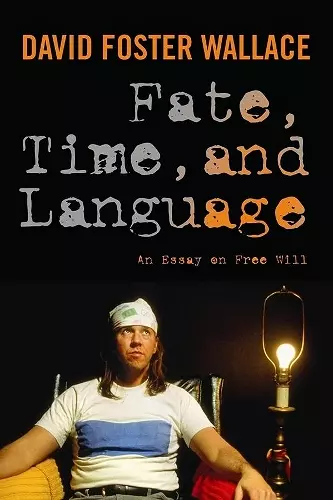Fate, Time, and Language
An Essay on Free Will
David Wallace author Steven Cahn editor Maureen Eckert editor James Ryerson editor
Format:Paperback
Publisher:Columbia University Press
Published:1st Feb '11
Currently unavailable, and unfortunately no date known when it will be back

I think Dave, foremost among a group of writers that also includes George Saunders and Rick Moody, created a new American literary idiom through which people who are young, or who aren't young but still feel like they are, can give voice to the full range of their intelligence and emotion and moral sensibility without feeling dorky and uncontemporary. It's very hard to read Dave and not feel almost peer-pressured to emulate him--his style is utterly contagious. But none of his emulators have his giant talent or his passionate precision. Somebody could write a whole monograph on how deliberately and artfully he deploys the modifier 'sort of.' -- Jonathan Franzen New York Times Book Review
In 1962, the philosopher Richard Taylor used six commonly accepted presuppositions to imply that human beings have no control over the future. David Foster Wallace not only took issue with Taylor's method, which, according to him, scrambled the relations of logic, language, and the physical world, but also noted a semantic trick at the heart of Taylor's argument. Fate, Time, and Language presents Wallace's brilliant critique of Taylor's work. Written long before the publication of his fiction and essays, Wallace's thesis reveals his great skepticism of abstract thinking made to function as a negation of something more genuine and real. He was especially suspicious of certain paradigms of thought-the cerebral aestheticism of modernism, the clever gimmickry of postmodernism-that abandoned "the very old traditional human verities that have to do with spirituality and emotion and community." As Wallace rises to meet the challenge to free will presented by Taylor, we witness the developing perspective of this major novelist, along with his struggle to establish solid logical ground for his convictions. This volume, edited by Steven M. Cahn and Maureen Eckert, reproduces Taylor's original article and other works on fatalism cited by Wallace. James Ryerson's introduction connects Wallace's early philosophical work to the themes and explorations of his later fiction, and Jay Garfield supplies a critical biographical epilogue.
Fatalism, the sorrowful erasure of possibilities, is the philosophical problem at the heart of this book. To witness the intellectual exuberance and bravado with which the young Wallace attacks this problem, the ambition and elegance of the solution he works out so that possibility might be resurrected, is to mourn, once again, the possibilities that have been lost. -- Rebecca Newberger Goldstein, author of Thirty-six Arguments for the Existence of God: A Work of Fiction As an early glimpse at the preoccupations of one of the 20th century's most compelling and philosophical authors, it is invaluable, and Wallace's conclusion... is simply elegant. Publishers Weekly This book is for any reader who has enjoyed the works of Wallace and for philosophy students specializing in fatalism. Library Journal [A] tough and impressive book.Financial Times -- Anthony Gottlieb Financial Times an excellent summary of Wallace's thought and writing which shows how his philosophical interests were not purely cerebral, but arose from, and fed into, his emotional and ethical concerns. -- Robert Potts Times Literary Supplement Fate, Time, and Laguage contains a great deal of first-rate philosophy throughout, and not least in Wallace's extraordinarily professional and ambitious essay... -- Daniel Speak Notre Dame Philosophical Review Valuable and interesting. -- James Ley Australian Literary Review A philosophical argument that deserves a place in any college-level library interested in modern philosophical debate. A lively, debative tone keeps this accessible to newcomers. Midwest Book Review
- Winner of Independent Publisher Book Award (gold medal) for Classical Studies / Philosophy 2011
ISBN: 9780231151573
Dimensions: unknown
Weight: unknown
264 pages